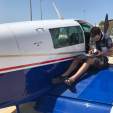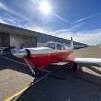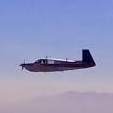All Activity
- Past hour
-

Retract Gear or Flaps First in a Go Around ?
Ibra replied to donkaye, MCFI's topic in Modern Mooney Discussion
That's exactly my logic, * I usually land with 1/2 flaps, so go-around is trivial, this rarely involve any compromise as it's usually optimal: gusty conditions on long runway * In cases where I land with full flaps are usually cases where I tend to go-around higher with plenty of speed, raising gear or flaps make no difference, I can even climb with full flaps (if they fail). The only case where compromise is involved is balked landing on short runway after long landing in calm hot conditions, it's very unlikely but one had to never say never. In this "unlikely case", I am on full flaps, slow speeds and not much runway left for go-around. In this case, I tend to prefer gaining speed in ground effect, raise gear to accelerate and then raise flaps. I had it probably twice and worked, one has to beleive in building speed even with obstacles in front, I could have fiddled with retracting flaps while climbing steeper. However, I prefer to see where I am going, worst case I am still in ground effect, if I am not going to make it: pull mixture, cut the loss and hope for the best. I think lot of things in aviation are done in a rush for "optimal performance", however, one rarely need to get to do that except few unlikely cases. For example, applying max power immediately on go-around, this only make sense in few exceptional cases. Most of the time, one can apply 1/2 power initially, fly level and re-trim, it's not "optimal" but it's "easier" than fighting with yoke ! -

Retract Gear or Flaps First in a Go Around ?
PeteMc replied to donkaye, MCFI's topic in Modern Mooney Discussion
Actually, @jamesm did chime in about getting the gear up. I have limited time with the manual gear, but I learned quickly why it is so important. -
McMooney started following Mooney 231 vs Rv-10 at 16k
-
If you build the Rv-10 can't you put a tio-360 in it, heck tio-540?
- Today
-
Yes this is an old thread and yes he probably can do 160 on 11.3 gallons at 12k but i do 160 at 12k on 10gallons or 1.3 gallons less than he does in my m20k and the kicker is every 1000 feet higher i go i pick up 2 to 3 knots on that same 10 gallons of gas per hour. The RV is stuck at that speed to fuel ratio. Even mooney’s own speed chart shows a 252 equals the speed of an ovation at around 14k in speed but even at that altitude the 252 is doing it on less fuel as simple physics a heavier aircraft is going to need more fuel burn to go the same speed as a lighter aircraft if the drag coefficients are similar. And even though the RV has a slick riveted wing that gear hanging out makes more drag than those flush rivets reduce. Course insurance is better for that fixed gear which is good helps him pay for more fuel used.
-
Based on the G100UL fuel leak thread what's your position?
gabez replied to gabez's topic in General Mooney Talk
-
Based on the G100UL fuel leak thread what's your position?
gabez replied to gabez's topic in General Mooney Talk
this is KWVI. I should clarify -
Based on the G100UL fuel leak thread what's your position?
redbaron1982 replied to gabez's topic in General Mooney Talk
I wonder how many "active" consumers are vs one or two times consumers. I haven't heard anyone using it on a regular basis. -
Based on the G100UL fuel leak thread what's your position?
MikeOH replied to gabez's topic in General Mooney Talk
I did not know that. Makes sense there'd be a spike. -

Based on the G100UL fuel leak thread what's your position?
varlajo replied to gabez's topic in General Mooney Talk
Didn't they start selling at one more airport recently? Somewhere in TX? -
Based on the G100UL fuel leak thread what's your position?
MikeOH replied to gabez's topic in General Mooney Talk
Wonder why it went up by 200 gallons (67%) in August? -

Based on the G100UL fuel leak thread what's your position?
varlajo replied to gabez's topic in General Mooney Talk
So, essentially, 10-ish fill ups per month nationwide, i.e. potentially as few as 5 or 6 planes using the fuel?.. Wow... -
Or is red and green positive and black wire is negative? Black is usually negative in car batteries.
-

Landing flap setting for "normal" landings in a J
Will.iam replied to Ftrdave's topic in Modern Mooney Discussion
Instead of marking where each stall is on different flap settings you might want to go up and see the relationship of stall warning horn to when you actually stall. My stall warning horn goes off about 3 to 4 knots before my wing stalls. This was great confidence and confirmation that i was landing( or trying to land) too fast as i never heard it go off and in the jet world you never do want to hear the stall warning. After a few dozen landings i got to where the stall horn goes off right before i touch down and that drastically cut down on my floating down the runway, just make sure you are very close to the ground when it happens and as you are bring up the nose to hold your altitude above the runway as the airspeed bleeds off in effect lowering your mains as you slow as they are behind the cg and thus you touch down with zero downward sink and only the slow pivoting force around the cg to make a smooth landing. Having a LHS (landing height system) also re confirms your site picture as i flare and hold the airplane with the LHS saying one one one until the mains touch. -
The positive wire is relative to which way you want it to turn. If you want it to go one way, green is +, if you want it to go the other way, black is +.
-
Based on the G100UL fuel leak thread what's your position?
gabez replied to gabez's topic in General Mooney Talk
-
IIRC, when the springs start to fail they are said to start chattering.
-
IFLYIFR started following Landing flap setting for "normal" landings in a J
-
Landing flap setting for "normal" landings in a J
IFLYIFR replied to Ftrdave's topic in Modern Mooney Discussion
Ftrdave, you might want to read “Why Can’t We Land” by Wayne Fisher. The article is specific to Mooneys. It is not explicitly about flaps but more focused on 1.3xVso approach speed and 1.2xVso threshold crossing speed. Sent from my iPad using Tapatalk -
Ftrdave changed their profile photo
-
If no one knows...that is fine. I will dig out the schematic and identify it myself. Just thought someone might be able to help.
-
I am NOT installing. It is a potential spare. All I want is what color of the four wires is positive and what is negative...
-

Landing flap setting for "normal" landings in a J
Ftrdave replied to Ftrdave's topic in Modern Mooney Discussion
Thank you to all for the great and thoughtful replies. As a pilot with 4000 hours in tactical fighter jets but barely 40 hours in single engine prop planes, I feel like a shiny new penny when flying my J. I'm absorbing every bit of knowledge and wisdom I can get my hands on regarding everything I never knew about flying "low and slow." Here are my big takeaways: 1. Absolutely have to be proficient in landing the aircraft in every flap configuration. Totally makes sense given all the reasons stated....and exactly what we did in fighters... 2. Choose the correct flap configuration for the conditions. This is where my experience falls short as Tomcats, Hornets and Super Hornets are always landed with the same flap setting (unless you have an emergency). I appreciate the discussion provided that lays out reasons for when to use each flap setting. 3. I need go slow flight and stall the aircraft in every configuration (not just full flap) so that I can document Vso for each and calculate 1.3Vso for each. 4. Have already learned the hard way that you have to fly this thing on-speed or just take it around! Thanks again for the discussion. If any of you are ever near KJNX, please stop by and visit (I'm the airport director)! Dave - Yesterday
-
Why isn't he using the old one as a template?
-
All, A&P is installing a new headliner from a two piece solid mold that has to be not only trimed but the holes have to be cut as it's a solid piece. Hes asking that any pictures of a complete headliner that could show exact placement of horns and lights would be appreciated. Can anyone with a 84j please share the layout of the headliner where the horns and lights are mounted and which ones go where?
-
Retract Gear or Flaps First in a Go Around ?
1980Mooney replied to donkaye, MCFI's topic in Modern Mooney Discussion
Since this was posted on the Modern Mooney forum, we have not heard from our J-bar pilots. I bet they would say that they are not wasting any time messing with flaps and that they want to get the gear up ASAP so that they don't have a wrestling match with the J-bar. -
Retract Gear or Flaps First in a Go Around ?
1980Mooney replied to donkaye, MCFI's topic in Modern Mooney Discussion
I think it means "Full 33 degree flaps reduced to take-off (I think it is 10 degrees on the Long Body), then raise Gear, and then reduce Take-off (10 degrees) to 0 degree Flaps". It has been discussed before and the consensus was that mid-body Mooney's don't climb very well with Full Flaps. Perhaps with more power in your Bravo it would not be as noticeable but still degraded.







